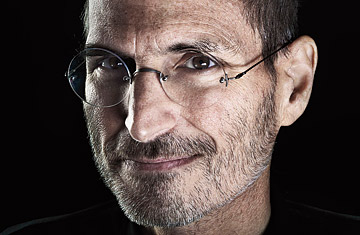
(5 of 6)
When I get to see Jobs, he is wearing the famous black turtleneck sweater and blue Levi's 501 jeans without which I would have cried,"Impostor!" Recent weight loss from his liver transplant has imparted a delicacy that reminds me, I can't think why, of the actor William Hurt. We meet in a conference room. On every spare shelf and ledge, at least a dozen iMacs are placed, each one playing a family slide show. Jobs leans back on his chair, feet up on the table, a welcoming grin on his face. My first question is a nervous babble that lasts five minutes. He listens with patient amusement and answers, "Yes." Or possibly, "No." I cannot remember what the question was. I had forgotten to turn on the recorder. I do so now, abashed.
A little calmer, I remind Jobs that at the product launch of the iPad in January, he had stood in front of two street signs, one reading "Liberal Arts," the other "Technology." "This is where I have always seen Apple," he told the audience, "at the intersection of the Liberal Arts and Technology."
I suggest there's a bit more to it than that; surely Apple stands at the intersection of liberal arts, technology and commerce? "Sure, what we do has to make commercial sense," Jobs concedes, "but it's never the starting point. We start with the product and the user experience. You seen an iBook yet?" His pleasure in showing me the Winnie the Pooh iBook bundled with every iPad is unaffected and engaging. He demonstrates how the case can be used as a lectern and as a stand. "I think the experience of using an iPad is going to be profound for many people," he says. "I really do. Genuinely profound." That rings a bell. "I've heard it said that this is the device for you," I reply. "The one that will change everything." "When people see how immersive the experience is," Jobs says, "how directly you engage with it ... the only word is magical."
In five years, Jobs has emerged from two serious health scares. His obituaries had been written, much as Apple's had been back in 1997. "Is this then the curtain dropping on your third act?" I ask. "Will you perhaps leave Apple on this high, a fitting end to your career here?" "I don't think of my life as a career," he says. "I do stuff. I respond to stuff. That's not a career--it's a life!"
After he leaves, I am finally left alone with an iPad. Finally I get some finger time. I peep under the slip holder, and there it is. When I switch it on, a little sigh escapes me as the screen lights up. Ten minutes later I am rolling on the floor, snarling and biting, trying to wrestle it from the hands of an Apple press representative.
That is not strictly true, but giving up the iPad felt a little like that. I had been prepared for a smooth feel, for a bright screen and the "immersive" experience everyone had promised. I was not prepared, though, for how instant the relationship I formed with the device would be. I left Cupertino without an iPad, but I have since gotten my own, and it goes with me everywhere.
